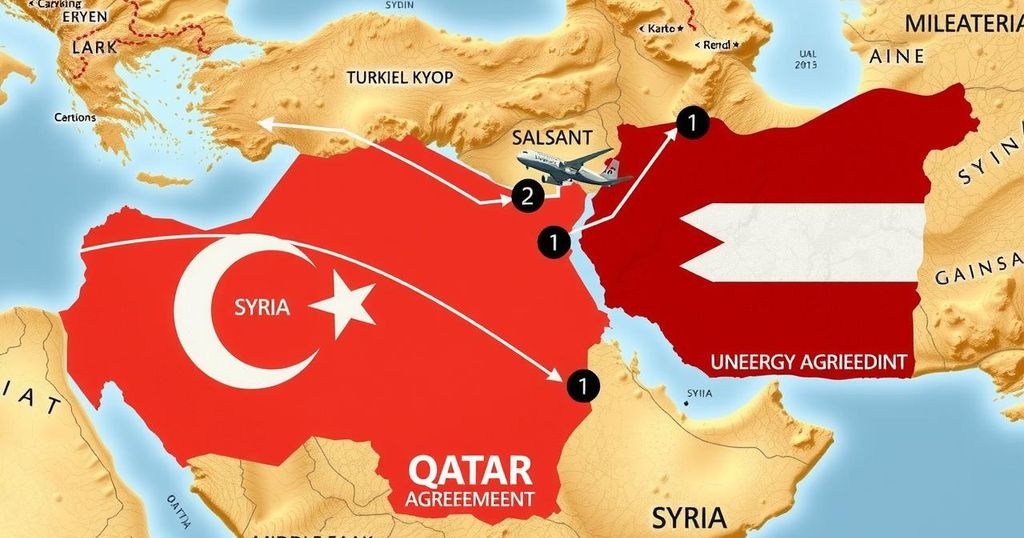Turkey and Qatar are emerging as key players in the reconstruction of Syria under President Trump’s reshaped Middle East policy. Their military and financial support aims to stabilize the region amid the U.S. withdrawal of conventional intervention. The alliance contrasts with other Gulf nations’ strategies, particularly the UAE’s, which faces challenges as the Arabian power dynamics shift.
Turkey and Qatar are increasingly at the forefront of U.S. President Donald Trump’s plans for the Middle East. Both nations are notably involved in Syria, where Qatari funds and gas supplies, coupled with Turkish military support, aim to aid the war-torn nation. This strategy aligns with Trump’s goal to step back from Western military interventions while allowing local powers to take charge.
Senior Arab officials recognize the roles of Turkey and Qatar in Syria’s recovery. “Trump has too much on his plate; China, Iran talks, the war in Ukraine. He doesn’t want to intervene. In Syria, he has these two local allies… He is going to lean on them,” stated a senior Arab official, reflecting the shifting dynamics of regional alliances. Qatar’s provision of gas to Syria via Jordan and Turkey’s discussions for a defense pact highlight their partnership.
The history of Turkey and Qatar’s involvement in Syria is significant; Turkey shares a long border with Syria and has been historically supportive of rebel forces seeking to unseat President Bashar al-Assad. In contrast, Qatar has taken a bold stance in recognizing Syria’s oppositional factions, which sets it apart from most Gulf nations. Meanwhile, the UAE has taken a very different approach, evidently negotiating a plan to lift sanctions on Assad if Iran’s power in the region decreases.
In a noteworthy development this past May, Turkey, Qatar, and the U.S. inked a substantial $7 billion energy deal aimed at constructing four gas power plants and one solar facility in Syria. This agreement signifies a broader commitment among these nations to revitalize Syria’s scarcities, indicating a concerted effort to draw investment into the beleaguered region.
Highlighting the importance of assorted regional players, U.S. envoy Thomas Barrack referred to Syria as a model for Trump’s ambitions in the Middle East. He expressed admiration for the partnership between Turkey and Qatar, emphasizing the roles they play within the context of regional aspirations of rebuilding following the downfalls of historical empires like the Ottoman.
Yet, the ongoing complexities ensue; U.S. relations with Turkey were tense under Biden due to differing views on the Syrian Democratic Forces (SDF), which Turkey associates with the PKK, a designated terrorist group. Furthermore, there’s widespread consensus that any return to stability in Syria hinges on addressing concerns pertinent to the PKK, illustrated by the remarks of Bassam Barabandi, a former Syrian diplomat.
Moreover, Trump’s withdrawal attempt from Syria during his first term reflected an underlying tension, definitively hampered by aides wary of losing strategic footholds against Iran. Despite the intent to downsize U.S. military presence, resistance from allies like Israel complicates these decisions. Amid these transitions, the dynamics between Turkey and Qatar will be pivotal in shaping a new landscape as their military and economic ties deepen.
The historical context surrounding Turkey and Qatar’s ongoing partnerships spans back to their unified stances during the Arab Spring, where both nations have openly defended various protest movements. The extent of this alliance now seems to bolster Trump’s evolving Middle East approach, indicating a significant shift from previous administrations that leaned more heavily towards traditional allies like Saudi Arabia.
On the contrary, the UAE’s standing has begun to show vulnerabilities, evidenced by frayed ties with Egypt over economic strategies and their controversial backing of the disjointed Libyan factions. The criticism of UAE’s regional dealings reflects badly as their alliances strain amid a civil war in Sudan, contrasting starkly with the synchronized actions of Turkey and Qatar in Syria.
Syria now stands as a litmus test for the effectiveness of the 2021 al-Ula agreement, which aimed to mend ties among Gulf nations. While Qatar and Saudi Arabia have made progress, the relationship between Qatar and the UAE remains tenuous at best. Thus, the prospect of a stable Syria becomes even more crucial to these nations’ overall agendas.
As negotiations advance and energy projects draw nearer to fruition, it seems as if Turkey and Qatar might cement their foothold in the region. This development not only reshapes Syria’s future but also reconfigures the possibility of the U.S. stepping back and allowing local powers to dictate their terms moving forward.
In summary, Turkey and Qatar’s involvement in Syria underscores a significant shift in the Middle East’s geopolitical landscape under Trump’s leadership. Their collaborative efforts in reconstruction and energy resource management, coupled with a notable disengagement from traditional Western intervention strategies, position them as pivotal players. As conflicts persist, the varying strategies of regional powers will determine Syria’s fate, with Turkey and Qatar stepping into roles that could redefine U.S.’s historical alliances and interventionist practices. Ultimately, aligning with these regional actors may serve the U.S. well in seeking stability in Syria, but balancing the interests of all players involved remains a complicated equation.
Original Source: www.middleeasteye.net






